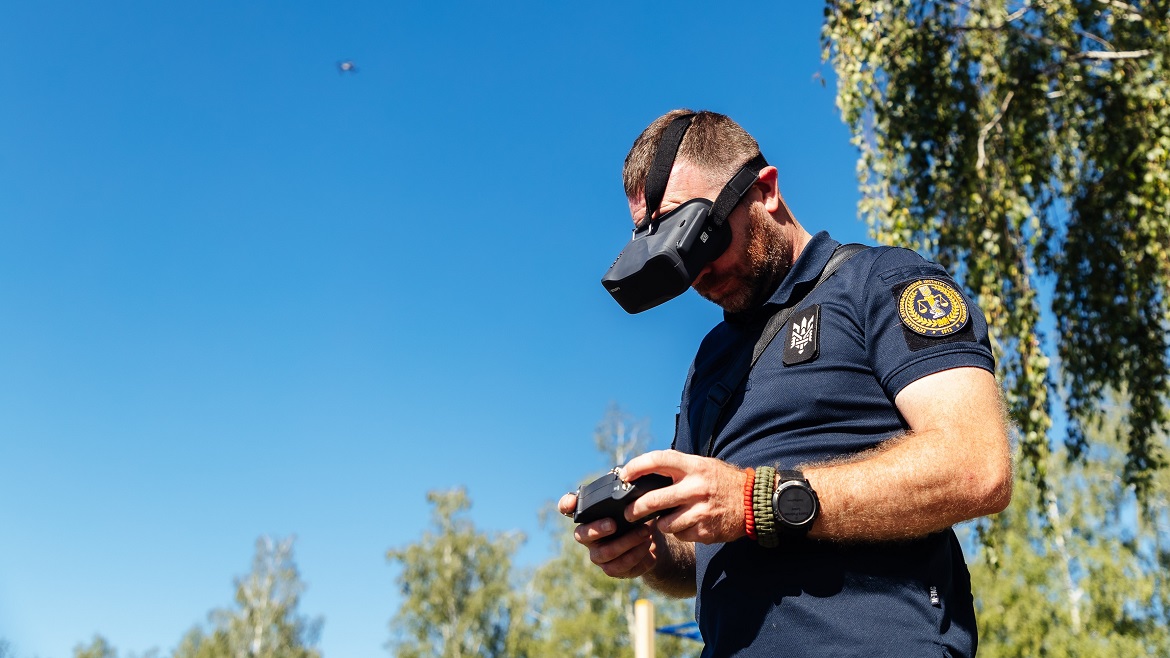Investigation of crimes in the modern world is becoming more and more technological, so investigators need to constantly improve their knowledge and skills of forensic techniques. Given number of war crimes and gross human rights violations stemming from the Russian Federation's aggressive war against Ukraine, maintaining highest level of professionalism is especially important for Ukrainian law enforcement officers who detect and investigate these crimes.
On 19-21 June some 60 investigators, criminologists and experts from forensic institutions of key law enforcement agencies that investigate war crimes took part in the workshop "Innovative criminalistics at the time of war", organized by the Council of Europe Project "Strengthening Ukrainian Law Enforcement Agencies During War and Post-War Period". The workshop was held at the training center of the National Academy of Internal Affairs of Ukraine.
Intensive workshop program was focused on cutting-edge approaches and tools for crime scene inspection, aero-forensics, evidence extraction and processing, interdisciplinary interaction in context of evidence collection and forensic examinations, as well as standards for chronological documentation of the sequence of receipt, control, transfer, analysis, placement of physical and electronic evidence.
In his welcoming speech, Erlend Falch, Deputy Head of the Council of Europe Office in Ukraine, noted: “Innovative is a strong word and a couple of years ago little did we think, we would be using it to describe useful tools and approaches in investigating war crimes and other crimes at the time of war. Sadly, the aggression of the Russian Federation against Ukraine perverted our perception of innovation and how it should be applied in the modern world, where democracy, rule of law and human rights are the highest value. Little would anyone want to ever use innovations for investigation of war crimes and during war. But, the universal truth is such that where there is time of turmoil, there is as well a momentum for brilliant ideas, smart solutions and their prompt application. And this is exactly what we see in Ukraine now”.
During three days, national and international Council of Europe experts, leading experts of forensic institutions of the Ministry of Justice, Ministry of Internal Affairs, Security Service of Ukraine, experienced investigators and criminologists of the State Bureau of Investigation, National Police, Security Service, independent technical experts not only shared their experience with participants, but also contributed to and encouraged exchange of practical experience between representatives of various law enforcement agencies and regions.
It was the coordination and inter-institutional cooperation of law enforcement officers in investigation of war crimes that was emphasized by Khrystyna Podyriako, Head of Unit of Investigations of Crimes Committed in Conditions of Armed Conflict of Main Investigative Department of the National Police of Ukraine: "We could not imagine the scale of crimes that were discovered in the de-occupied territories. Therefore, in order to bring all the perpetrators to justice, systematic cooperation of all law enforcement agencies was and is still crucially needed".
Serhii Kostin, Head of Unit of Main Investigative Department of State Bureau of Investigation, noted that at this workshop "representatives of all law enforcement agencies are united with both, the goal of gaining new knowledge and the opportunity to build a system of horizontal cooperation, which allows us to have colleagues in every region of our country".
Serhii Cherniavskyi, Vice-rector of the National Academy of Internal Affairs, in turn noted that the institution is glad to welcome practicing investigators and a wide range of experts: "We interpret Council of Europe support as trust in everything we do. The trainers of the Academy are regularly in the field close to the combat zone, and with their experience, we were able to create training areas that correspond to specifics of investigation of war crimes".
The workshop combined theoretical sessions with practice. Participants had opportunity to familiarize themselves with laboratories for express DNA analysis, hardware and software complexes for reading information from vehicle safety system control modules, unmanned aerial vehicles for aerial photography and 3D modelling, remnants, fragments of various types of weapons, devices and software for audio-video recording of investigative (search) action with subsequent creation of its transcript (protocol). Experts shared their experience in use of polygraph in criminal proceedings, examination of texts and statements for investigation of crimes of genocide, collaborative activities and propaganda, identification of persons, peculiarities of investigation of mass burials and places of torture, extraction and processing of electronic evidence from various carriers.
Special place in the program was allocated for the competition of practitioners-investigators, during which they had opportunity to apply acquired skills and knowledge at simulated sites of war crimes - locations "mass burial", "torture chamber" and "shelled convoy of civilian transport".
Participants especially noted opportunity to establish a dialogue with colleagues from other law enforcement agencies. Trainers, in turn, emphasized that division into trainers and trainees was conditional, as all present investigators and criminologists are top professionals in their field. Interaction during the workshop nurtured the "equal to equal" principle, where experience of each professional present was recognized as unique and useful for all participants.
"Investigation of every separate war crime involves collection of a significant mass of information and evidence under extreme conditions and within significant time constraints. Modern technology and equipment significantly facilitate our work, and I am grateful to the Council of Europe for the opportunity to obtain up-to-date knowledge. However, people – specialists who work with evidence daily - are the main value. The most valuable thing that I gained during these three days is contact and interaction with colleagues, from whom I can now seek advice directly for practical issues" noted workshop participant, investigator of investigative department of the Security Service of Ukraine in Zaporizhzhia region.







